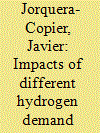|
|
|
Sort Order |
|
|
|
Items / Page
|
|
|
|
|
|
|
| Srl | Item |
| 1 |
ID:
125810


|
|
|
|
|
| Publication |
2013.
|
| Summary/Abstract |
An impact of increased variable renewable generation is the need for balancing authorities to procure more ancillary services. While demand response resources are technically capable of providing these services, current experience across the U.S. illustrates they are relatively minor players in most regions. Accessing demand response resources for ancillary services may require a number of changes to policies and common practices at multiple levels. Regional reliability councils must first define ancillary services such that demand response resources may provide them. Once the opportunity exists, balancing authorities define and promulgate rules that set the infrastructure investments and performance attributes of a resource wishing to provide such services. These rules also dictate expected revenue streams which reveal the cost effectiveness of these resources. The regulatory compact between utility and state regulators, along with other statutes and decisions by state policymakers, may impact the interest of demand response program providers to pursue these resources as ancillary service providers. This paper identifies within these broad categories specific market and policy barriers to demand response providing ancillary services in different wholesale and retail environments, with emphasis on smaller customers who must be aggregated through a program provider to meet minimum size requirements for wholesale transactions.
|
|
|
|
|
|
|
|
|
|
|
|
|
|
|
|
| 2 |
ID:
124085


|
|
|
|
|
| Publication |
2013.
|
| Summary/Abstract |
Jacobson et al. (2013) recently published a paper arguing the feasibility of meeting all of the energy demands in New York State with wind, solar, and water resources. In this forum we suggest that the authors do not present sufficient analysis to demonstrate the technical, economic, and social feasibility of their proposed strategy.
|
|
|
|
|
|
|
|
|
|
|
|
|
|
|
|
| 3 |
ID:
192707


|
|
|
|
|
| Summary/Abstract |
As countries continue to update their climate ambitions, they are seeking cost-effective solutions for decarbonizing energy use. In this context, low-carbon hydrogen production and use presents relevant opportunities for emissions reductions and economic development, and recent studies show important potential benefits from integrating electricity and hydrogen networks. Based on a novel mathematical optimization model, we conduct a case study for Chile in 2020–2050 to assess the least-cost evolution of the integrated hydrogen–electricity system, testing different carbon prices, 100% renewable mandates, and incorporating domestic and international hydrogen demand. By optimizing over various scenarios, we find that, due to the country’s significant renewable potential and the flexibility that electrolyzers can provide, adding hydrogen exports to domestic hydrogen use may enhance renewable integration, while not necessarily increasing average wholesale electricity prices for typical end-users (relative to our baseline scenario), but also make battery deployment unattractive. Further, we conclude that climate policies such as a high carbon price or a 100% renewable mandate may be crucial to achieve a fully renewable system by 2050 and reduce cumulative emissions, resulting in 3%–14% higher net present system costs. Finally, we discuss that various concerns such as water and land use must be addressed by policymakers.
|
|
|
|
|
|
|
|
|
|
|
|
|
|
|
|
| 4 |
ID:
166953


|
|
|
|
|
| Summary/Abstract |
Distributed photo-voltaic (PV) generation is one of the pillars of energy transitions around the world, but its deployment in the distribution grid requires costly reinforcements and expansions. Prosumage – consisting of a household-level PV unit coupled with a battery storage system – has been proposed as an effective means to facilitate the integration of renewable energy sources and reduce distribution grid stress. However, tapping its full potential requires regulatory interventions; otherwise, system costs could rise despite increasing flexibility. We analyze the effectiveness of different policy schemes to mitigate the need for distribution capacity expansion by incentivizing beneficial storage operation. Our novel top-down modeling approach allows analyzing effects on market prices, storage dispatch, induced distribution grid requirements, system costs, and distributional implications. Based on German power system data, numerical results indicate that distribution grid requirements can be reduced through simple feed-in policies. A uniform limit on maximum grid feed-in can leave distribution system operators better off, even if they fully compensate prosumage households for foregone revenue. Policies imposing more differentiated limits at the regional level result in only marginal efficiency improvements. Complete self-sufficiency (autarky) is socially undesirable, as it confines important balancing potential and can increase system costs despite adding storage.
|
|
|
|
|
|
|
|
|
|
|
|
|
|
|
|
| 5 |
ID:
176665


|
|
|
|
|
| Summary/Abstract |
The Colombian short-term electricity market is characterised by a single settlement and by the clearing of a single national hourly spot price for the entire grid. This price is computed ex post, based on the real-time operation of the system. In the day ahead, there is only an operational dispatch, which does not set any binding economic commitment. A deviation from such dispatch (due, for instance, to an outage), if it is informed in advance, has no economic consequence for market agents. As recognised by Colombian regulatory institutions, this design is not suitable to efficiently integrate large shares of variable renewable resources.
|
|
|
|
|
|
|
|
|
|
|
|
|
|
|
|
|
|
|
|
|